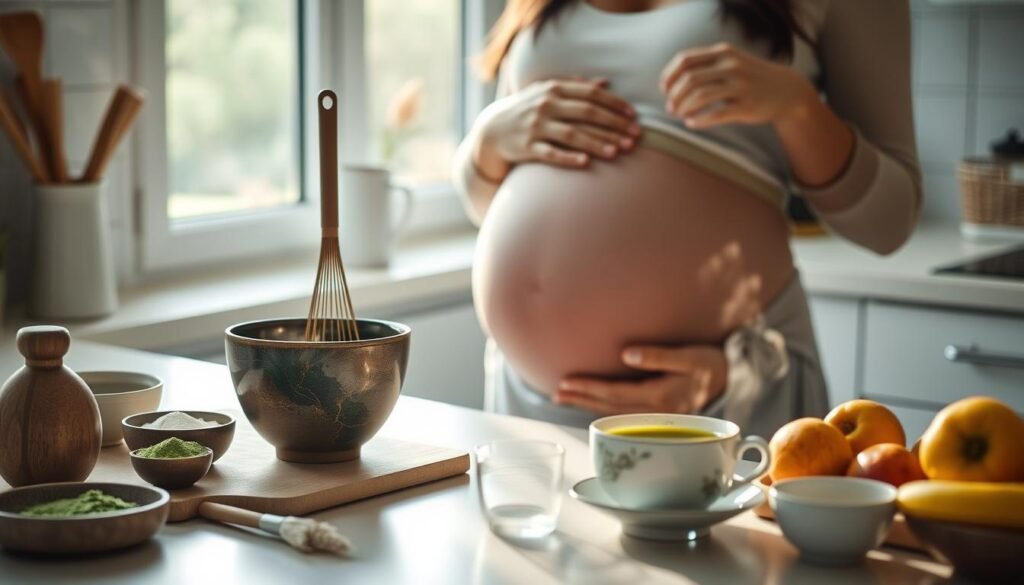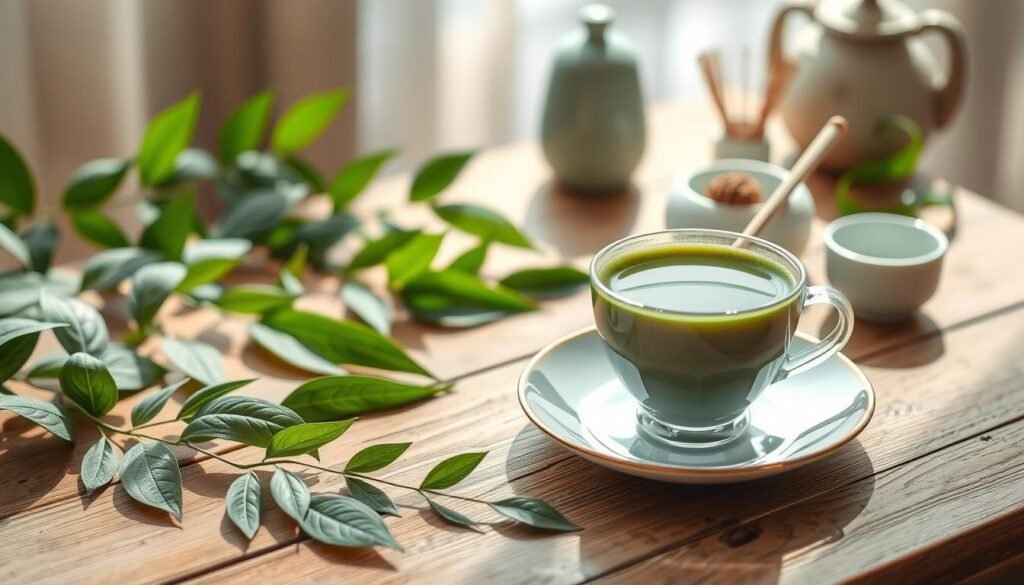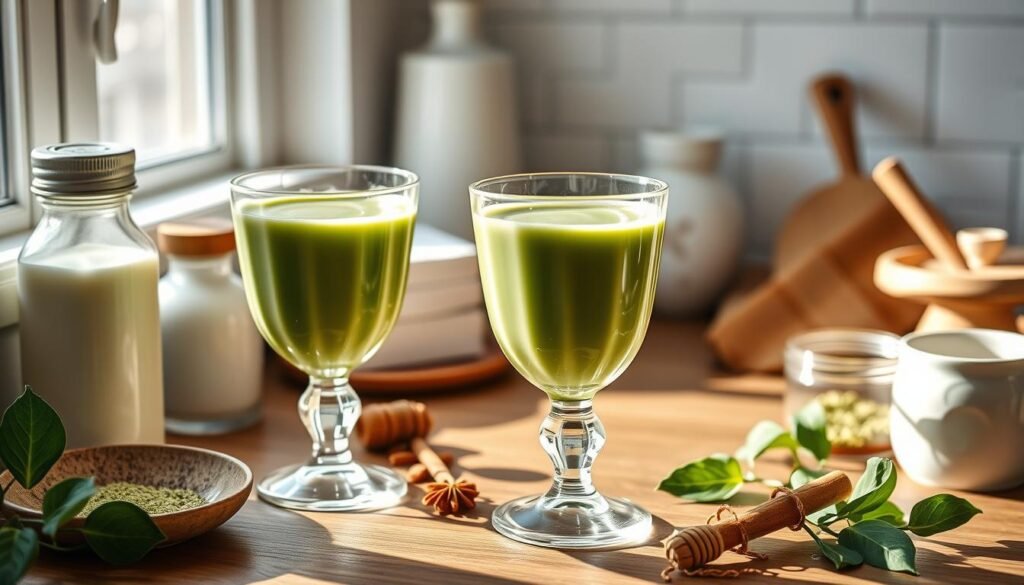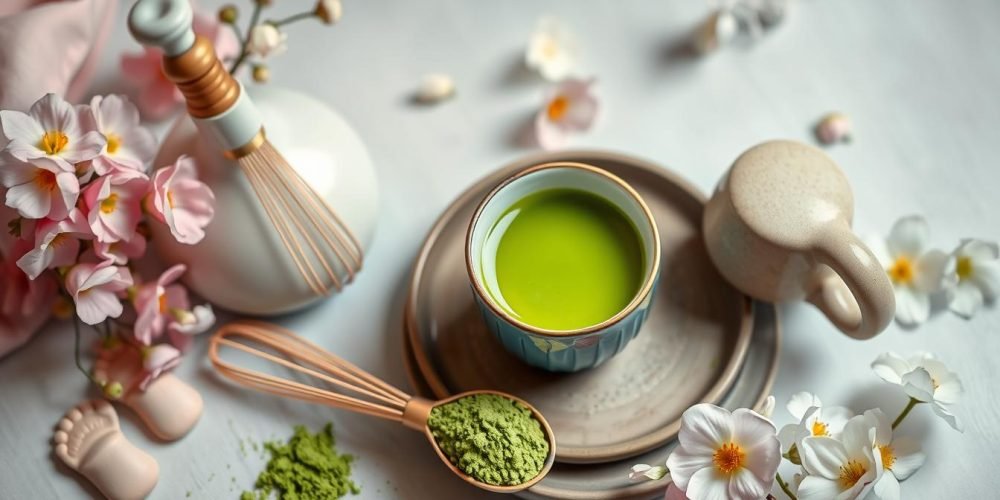Is Matcha Safe During Pregnancy ? Expectant mothers often wonder if matcha is safe to drink during pregnancy. Matcha and pregnancy can seem like a confusing topic. It’s important to know the good and bad sides of matcha for pregnant women.
It’s key to understand how matcha affects pregnancy. We’ll look into matcha’s ingredients, nutrients, and caffeine levels. This will help answer if matcha is safe for pregnant women.
Key Takeaways
- Matcha consumption during pregnancy requires careful consideration of caffeine intake
- Understanding the nutritional profile of matcha is essential for making informed decisions
- Matcha and pregnancy can be a safe combination when consumed in moderation
- Expectant mothers should be aware of the potential risks associated with matcha consumption
- Consulting a healthcare provider is recommended before consuming matcha during pregnancy
Understanding Matcha and Its Components
Is Matcha Safe During Pregnancy ? Matcha powder has been a key part of Japanese culture for centuries. Its health benefits and unique taste have made it popular worldwide. It’s packed with antioxidants, vitamins, and minerals, appealing to those who care about their health.
Matcha is rich in vitamin C, vitamin E, and potassium. It also has amino acids and catechins. These elements are linked to matcha’s health benefits. The L-theanine and caffeine in matcha can also boost mood and energy.
What is matcha powder?
Matcha powder is a finely ground green tea. It’s made from the young leaves of the Camellia sinensis plant. These leaves are grown in the shade and picked by hand for the best quality.
Nutritional profile of matcha
Matcha’s nutritional profile is impressive. It’s full of vitamins, minerals, and antioxidants. Key nutrients include:
- Vitamin C: important for immune function and overall health
- Vitamin E: acts as an antioxidant to protect cells from damage
- Potassium: essential for heart health and blood pressure regulation
- Amino acids: building blocks of protein that support overall health
- Catechins: a type of antioxidant found in high levels in matcha
Active compounds in matcha
Is Matcha Safe During Pregnancy? The active compounds in matcha, like L-theanine and caffeine, give it its unique taste and health benefits. L-theanine helps with relaxation and stress reduction. Caffeine provides a natural energy boost. Together, they enhance focus and productivity.
Matcha powder is a nutrient-rich food with many health benefits. Knowing about matcha’s nutrition and compounds helps people decide to add it to their diet.
| Compound | Benefits |
|---|---|
| L-theanine | Promotes relaxation, reduces stress levels |
| Caffeine | Provides a natural energy boost, improves focus and productivity |
| Catechins | Acts as an antioxidant, protects cells from damage |
The Relationship Between Caffeine and Pregnancy
Is Matcha Safe During Pregnancy ? Caffeine and pregnancy are topics many expectant mothers worry about. Caffeine is a stimulant that can impact the body, especially during pregnancy. It’s important to understand how caffeine and pregnancy relate to ensure a healthy pregnancy.
When it comes to matcha and caffeine, being careful with caffeine intake is key. Matcha has less caffeine than other caffeinated drinks. But, too much caffeine can raise the risk of miscarriage, growth issues, and other pregnancy problems.
Here are some key points to consider:
- Moderate caffeine, up to 200mg a day, is usually safe for pregnant women.
- Matcha has a small amount of caffeine, but watch your total caffeine intake.
- Too much caffeine can lead to pregnancy complications.
To have a healthy pregnancy, it’s vital to grasp the link between caffeine and pregnancy. Be careful with your caffeine intake, including matcha and caffeine.
| Caffeine Source | Caffeine Content |
|---|---|
| Matcha | 30-40mg per 8oz cup |
| Coffee | 60-180mg per 8oz cup |
| Tea | 20-70mg per 8oz cup |
Is Matcha Safe During Pregnancy: Medical Perspective
Is Matcha Safe During Pregnancy ? Many expectant mothers wonder about matcha safety during pregnancy. Research on matcha and pregnancy is growing. It shows that most pregnant women can safely enjoy matcha in moderation.
Healthcare providers advise pregnant women to talk to them before drinking matcha. This is because matcha has caffeine, which can be a worry during pregnancy.
Research Findings on Matcha Consumption
Studies say matcha has less caffeine than other caffeinated drinks. This makes it a good option for pregnant women who want to keep caffeine low. But, everyone reacts differently to caffeine.
Expert Recommendations
Is Matcha Safe During Pregnancy ? Experts tell pregnant women to be careful with matcha. They should talk to their healthcare providers if they’re worried. It’s also wise to pick high-quality matcha that’s free from harmful substances.
Some important tips for pregnant women who want to try matcha include:
- Start with small amounts to gauge tolerance
- Choose matcha products that are certified lead-free
- Avoid consuming matcha in excess of 200mg of caffeine per day
Comparing Matcha to Other Caffeinated Beverages
Matcha has less caffeine than many other caffeinated drinks. This makes it a safer choice for pregnant women who want to watch their caffeine intake. Still, it’s important to follow matcha safety during pregnancy guidelines for a healthy pregnancy.
Benefits of Matcha for Pregnant Women
Matcha is good for pregnant women because it boosts antioxidant intake, fights inflammation, and strengthens the immune system. It also has lots of folate, which helps the fetus grow and lowers the chance of birth defects.
Some of the key matcha benefits for pregnant women include:
- Improved heart health due to the high levels of antioxidants and flavonoids
- Reduced risk of anemia due to the iron content in matcha
- Enhanced cognitive function and mood due to the amino acid L-theanine
Overall, matcha and pregnancy benefits make it a great choice for pregnant women’s diets, in moderation. It’s important to talk to a healthcare provider before changing your diet during pregnancy.
Adding matcha to your diet can help your health and well-being during pregnancy. With its many matcha benefits for pregnant women, it’s a smart pick for a natural energy boost and supporting your baby’s growth.
| Benefit | Description |
|---|---|
| Antioxidant intake | Matcha contains high levels of antioxidants, which can help protect against cell damage and reduce inflammation |
| Immune function | Matcha contains vitamins and minerals that can help support immune function and reduce the risk of illness |
| Fetal development | The high levels of folate in matcha may support fetal development and reduce the risk of birth defects |
Potential Risks and Concerns
When thinking about matcha during pregnancy, knowing the risks is key. Matcha can pose risks to both the mother and the baby. It’s important for expectant mothers to understand these risks.
Matcha may contain caffeine, which can be a problem for some. It also might have lead, which is harmful to a growing baby. Plus, everyone reacts differently to matcha, so it’s crucial to be careful.
Here are some important things to think about when it comes to matcha and pregnancy:
- Caffeine content: High levels of caffeine in matcha can be a concern for women who are sensitive to caffeine or have high blood pressure.
- Lead exposure: Some matcha products may contain high levels of lead, which can be harmful to the developing fetus.
- Individual sensitivity: Women with allergies or intolerances should be cautious when consuming matcha during pregnancy.
To stay safe, pregnant women should talk to their doctor before trying matcha. Knowing the risks and taking steps to avoid them can help. This way, women can enjoy matcha while keeping their pregnancy healthy.
| Potential Risk | Description |
|---|---|
| Caffeine Content | High levels of caffeine in matcha can be a concern for women who are sensitive to caffeine or have high blood pressure. |
| Lead Exposure | Some matcha products may contain high levels of lead, which can be harmful to the developing fetus. |
| Individual Sensitivity | Women with allergies or intolerances should be cautious when consuming matcha during pregnancy. |
Safe Consumption Guidelines During Pregnancy
When it comes to matcha consumption guidelines during pregnancy, it’s key to focus on safe matcha consumption. Pregnant women should talk to their healthcare providers before drinking matcha. This is especially true if they have health issues or concerns.
To ensure safe matcha consumption, women should follow these guidelines:
- Limit matcha intake to moderate levels
- Avoid matcha products that contain high levels of lead or other contaminants
- Be mindful of overall caffeine intake
By following these matcha consumption guidelines during pregnancy, women can enjoy matcha’s benefits while avoiding risks. It’s important to prioritize safe matcha consumption and get advice from healthcare providers.

Remember, a healthy pregnancy is the main goal, and safe matcha consumption is part of a balanced lifestyle. Always talk to your healthcare provider before changing your diet or routine.
| Matcha Consumption Guidelines | Recommendations |
|---|---|
| Limit matcha intake | Moderate levels (1-2 cups per day) |
| Avoid contaminated matcha products | Choose high-quality, lead-free matcha products |
| Monitor caffeine intake | Be mindful of overall caffeine consumption from all sources |
Best Times to Drink Matcha While Pregnant
Timing is key when it comes to matcha during pregnancy. The best time to drink it can vary. Some like it in the morning for energy, while others avoid it at night to sleep better.
Morning Consumption Benefits
Drinking matcha in the morning boosts energy and focus. It has a bit of caffeine to wake you up. Plus, it’s full of antioxidants and nutrients for health.
Avoiding Late-Day Intake
It’s wise to skip matcha in the late afternoon or evening. The caffeine can mess with your sleep. Pregnant women should listen to their bodies and adjust their matcha times.
Here are some tips for matcha during pregnancy:
- Start with a small amount: If you’re new to matcha, start with a small amount (about 1/2 teaspoon) and gradually increase your intake as needed.
- Be mindful of caffeine content: Matcha contains a small amount of caffeine, so be mindful of your overall caffeine intake and avoid consuming matcha in the late afternoon or evening.
- Listen to your body: Pay attention to how your body reacts to matcha and adjust your consumption schedule accordingly.
Quality Considerations for Pregnancy-Safe Matcha
Choosing a matcha product during pregnancy is crucial. It should be high-quality and free from harmful substances. Look for pregnancy-safe matcha that is certified organic, non-GMO, and lead-free.
Pregnant women should carefully read labels. Avoid matcha with high caffeine or stimulants. Here are key factors for a pregnancy-safe matcha product:
- Certification: Ensure the matcha is certified organic, non-GMO, and lead-free.
- Label transparency: Opt for matcha with clear labels, showing caffeine content and allergens.
- Brand reputation: Research the brand and check customer reviews for high-quality matcha.

By focusing on these points, pregnant women can safely enjoy
Signs You Should Reduce or Avoid Matcha
Matcha can be good for pregnant women, but some signs mean you might need to cut back or stop. Symptoms like headaches, nausea, or dizziness could be linked to matcha side effects during pregnancy. If you notice these, talk to your doctor right away.
Some common matcha and pregnancy symptoms to watch for include:
- Increased heart rate or blood pressure
- Insomnia or difficulty sleeping
- Anxiety or jitteriness
If you’re feeling any of these symptoms, it’s important to talk to your doctor. They can help figure out if matcha is safe for you. They’ll also guide you on how to avoid any matcha side effects during pregnancy.
When it comes to matcha and pregnancy symptoms, it’s better to be safe than sorry. If you’re not sure about matcha during pregnancy, always check with your doctor. They can give you advice that’s right for you.
| Potential Symptom | Description |
|---|---|
| Headaches | Mild to severe headaches that may be related to matcha consumption |
| Nausea | Feeling queasy or lightheaded, which may be a sign of matcha side effects during pregnancy |
| Dizziness | Feeling unsteady or disoriented, which may be related to matcha and pregnancy symptoms |
Preparing Pregnancy-Safe Matcha Drinks
When making pregnancy-safe matcha drinks, there are important things to think about. Pregnant women can have matcha in many ways, like traditional tea, lattes, or smoothies. It’s key to use top-notch matcha powder and watch what you add to it.
Some favorite matcha recipes for pregnant women are:
- Traditional matcha tea: Whisk 1 teaspoon of matcha powder with 8 oz of hot water.
- Matcha latte: Mix 1 teaspoon of matcha powder with 3 oz of hot milk and 5 oz of steamed milk.
- Matcha smoothie: Blend 1 teaspoon of matcha powder with 1 cup of frozen fruit, 1/2 cup of yogurt, and 1/2 cup of milk.
When making pregnancy-safe matcha drinks, stay away from too much sugar, creamers, or other not-so-good ingredients. By sticking to these easy recipes and tips, pregnant women can enjoy matcha safely and healthily.

Always talk to a doctor before trying new foods or drinks, like matcha recipes for pregnant women. Being careful with ingredients and how you make them lets pregnant women have tasty and pregnancy-safe matcha drinks while keeping their pregnancy healthy.
Matcha Alternatives During Pregnancy
For pregnant women who want to avoid matcha or are sensitive to caffeine, there are several matcha alternatives during pregnancy that can provide similar nutritional benefits. These alternatives can help women maintain a healthy diet while minimizing potential risks associated with matcha consumption.
Some popular caffeine-free matcha options include herbal teas, such as peppermint or chamomile, which offer a soothing and calming effect. Other green tea products that are caffeine-free can also be a good alternative, providing essential antioxidants and vitamins.
Caffeine-Free Options
- Herbal teas: peppermint, chamomile, and lemon balm
- Caffeine-free green tea products
- Fruits and vegetables rich in antioxidants and essential vitamins and minerals
Similar Nutritional Alternatives
Pregnant women can also consider alternative sources of antioxidants and essential vitamins and minerals, such as whole grains, lean proteins, and healthy fats. These alternatives can help ensure that women are getting the necessary nutrients for a healthy pregnancy.
By exploring these matcha alternatives during pregnancy and caffeine-free matcha options, women can make informed decisions about their diet and lifestyle during this critical period.
| Alternative | Nutritional Benefits |
|---|---|
| Herbal Teas | Antioxidants, calming effect |
| Caffeine-Free Green Tea | Antioxidants, essential vitamins and minerals |
| Fruits and Vegetables | Antioxidants, essential vitamins and minerals |
Common Myths About Matcha and Pregnancy
There are many matcha and pregnancy myths that expectant mothers should know. One myth is that matcha is safe to drink during pregnancy. But, too much matcha can mean too much caffeine, which might harm the baby.
Another common matcha myth is that it can fix morning sickness. But, there’s not much science backing this up. It’s key for pregnant women to talk to their doctors about matcha to know what’s safe.
Some matcha and pregnancy myths include:
- Matcha is a miracle cure for pregnancy-related symptoms
- Matcha is completely safe to consume in large quantities during pregnancy
- Matcha can reduce the risk of pregnancy complications
To have a healthy pregnancy, knowing these common matcha myths is important. Always check with a healthcare provider before drinking matcha or any caffeinated drinks. This way, expectant mothers can make smart choices and have a healthy pregnancy.
Tips for Incorporating Matcha Safely
When you add matcha to your diet while pregnant, it’s key to follow matcha safety tips. This ensures a healthy and safe experience. One important thing is to control how much matcha you drink. Drinking it in moderation can help avoid risks.
To safely add matcha to your pregnancy diet, keep these tips in mind:
- Start with small amounts: Begin with a small amount of matcha and gradually increase your intake as needed.
- Avoid late-day consumption: Refrain from consuming matcha in the late afternoon or evening to prevent disrupting your sleep patterns.
- Be mindful of overall caffeine intake: Pay attention to your overall caffeine consumption from all sources, including matcha, coffee, and other beverages.
By following these tips and listening to how your body reacts to matcha, you can enjoy its benefits. Always put your health first and talk to your healthcare provider if you have any worries.
| Matcha Consumption Guidelines | Recommendations |
|---|---|
| Portion control | Limit matcha intake to moderate levels |
| Timing | Avoid matcha in the late afternoon or evening |
Conclusion
Matcha can be a safe and good choice for pregnant women if done right. It’s important to follow health advice, watch caffeine intake, and choose quality matcha. This way, expectant mothers can enjoy its benefits while keeping their health and baby’s safe.
Before adding matcha to their diet, pregnant women should talk to their doctor. The doctor can give advice based on the woman’s health and needs. This way, they can make choices that help them have a healthy pregnancy and a happy baby.




